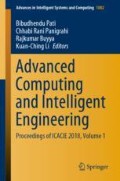Abstract
Knowledge space theory has so far most predominantly found applications in e-learning and educational assessment systems. The principles of knowledge space theory can however also be used in the assessment of a system, device, or application in terms of accessibility. A precedence order among the Web Content Accessibility Guidelines (WCAG) can be discovered through careful analysis, and expert knowledge can be used to construct a knowledge structure with each knowledge state representing a set of these guidelines. This is useful not only in gaining an understanding of where a system lies on its way toward becoming universally accessible but also helps in determining the next steps for improvement of the analyzed system’s accessibility from the outer fringe of the current knowledge state. This is a more feasible way of judging a system for its accessibility since it shows exactly in terms of which guidelines the assessed system is accessible. The standards for acceptable accessibility criteria specified and met by organizations or industries will thus be in terms of knowledge states instead of a numerical or graded value. This invokes comprehensiveness, clarity, and customization in practice of accessibility testing.
Access this chapter
Tax calculation will be finalised at checkout
Purchases are for personal use only
References
Doignon, J.-P., Falmagne, J.-Cl.: Knowledge Spaces. Springer, Berlin (1999)
Falmagne, et al.: The assessment of knowledge, in theory and in practice. Springer, Berlin (2006)
Falmagne JC., Cosyn E., Doignon JP., Thiéry N.: The assessment of knowledge, in theory and in practice. In: Missaoui, R., Schmidt, J. (eds.) Formal Concept Analysis. Lecture Notes in Computer Science, vol 3874. Springer, Berlin (2006)
Albert, D., Lukas, J. (eds.): Knowledge Spaces: Theories, Empirical Research, Applications. Lawrence Erlbaum Associates, Mahwah (1999)
World Wide Web Consortium: Web Content Accessibility Guidelines (WCAG) 2.0 (2008). https://www.w3.org/TR/WCAG20/
Gouli, E., Gogoulou, A., Papanikolaou, K., Grigoriadou, M.: Compass: an adaptive web-based concept map assessment tool. In: Proceedings of the 1st International Conference on Concept Mapping, Pamplona, 14–17 September 2004, pp. 295–302 (2004)
World Wide Web Consortium: How to meet WCAG 2.0. https://www.w3.org/WAI/WCAG20/quickref/
Author information
Authors and Affiliations
Corresponding author
Editor information
Editors and Affiliations
Rights and permissions
Copyright information
© 2020 Springer Nature Singapore Pte Ltd.
About this paper
Cite this paper
Gupta, N. (2020). Exploring Application of Knowledge Space Theory in Accessibility Testing. In: Pati, B., Panigrahi, C., Buyya, R., Li, KC. (eds) Advanced Computing and Intelligent Engineering. Advances in Intelligent Systems and Computing, vol 1082. Springer, Singapore. https://doi.org/10.1007/978-981-15-1081-6_49
Download citation
DOI: https://doi.org/10.1007/978-981-15-1081-6_49
Published:
Publisher Name: Springer, Singapore
Print ISBN: 978-981-15-1080-9
Online ISBN: 978-981-15-1081-6
eBook Packages: EngineeringEngineering (R0)

